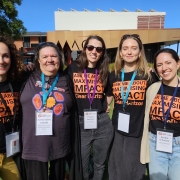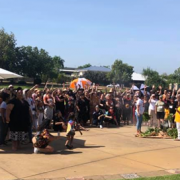Can MSC play a role in program design?
In my most recent blog I explored a light bulb moment around Developmental Evaluation. Since then I have been musing about the role of the Most Significant Change Technique (MSC) in design and Developmental Evaluation. Although MSC certainly wouldn’t be the only tool you would use; I think MSC could be an exciting part of a Developmental Evaluator’s tool kit.
Developmental Evaluation is appropriate to use in innovative, complex and adaptive environments, it allows evaluation to occur even when the end point (or the path to get there) isn’t known. Developmental Evaluation sees the evaluator working collaboratively with the social entrepreneur (or other program designers) in the design phase of a new program. It is a way to get rapid feedback on the design and approach, and on how the program can be improved.
MSC can be an insightful tool for capturing emergent or unknown outcomes and helps us to make sense of impact and causality. A strength of MSC is that it enables the perspective of the user to be known and understood. Three ways we think MSC could assist to provide user feedback as part of a developmental evaluation include:
- Using MSC for historical analysis
- Using MSC to test social innovations
- Using MSC to envisage alternative solutions
MSC for historical analysis
Using MSC in planning helps examine the historical context and how program participants have experienced and valued past interventions. In the past we have used MSC to inform the development of a community action strategy. The MSC question was broad. For example: “from your point of view, what is the most significant change that has resulted from any intervention in this community?” After the collection of MSC stories by trained volunteers, they were selected in large group settings. The outputs from this process were used to inform the situation analysis in a similar way to the technique Appreciative Inquiry. One difference between this usage of MSC in planning and Appreciative Inquiry, is that MSC stories do not necessarily seek only positive stories; they can also reveal the most significant negative changes. This information can be an insightful input into the design of a new program.
MSC for testing social innovations
When piloting a new social innovation, MSC can be used to help users to articulate the impact of the pilot on their lives and their communities. In this way it can be used to rapidly test possible innovations that are being piloted, particularly the immediate outcomes. The key here is allowing the users to interpret the benefits and negative impacts of the innovation in their words.
MSC for envisaging solutions
MSC has also been used in a future-orientated manner to help develop future vision and goals. In this context instead of collecting stories about the past, participants are invited to write a story about their ‘desired future’. The process follows six steps:
- Set a future point in time – for example 5 years.
- In a group setting, brainstorm a range of possible future scenarios that might arise from this program if it is successful (or unsuccessful).
- Individually or in sub-groups, choose one scenario from this list that represents what you would most like to see happen.
- Flesh this scenario out into a story – with a beginning, middle and end – as if it had already happened. For example, describe the changes that happen in a participant’s life, and what difference it made to them.
- End with why you chose that particular scenario to write a story about.
- You can then share stories and select the most significant one, but in so doing also develop a set of future outcomes you wish to see, and a set of values.
This technique is akin to scenario planning – or visioning. This is an accessible way to develop a future vision that is grounded in how people may see a new program.
MSC is a versatile M&E tool, which as well as being used to uncover the impacts of current or completed programs, can also be used to evaluate programs in the design phase – either by drawing out historical lessons, providing feedback on pilot interventions or through envisaging the desired future.
Clear Horizon is running public training on MSC in Melbourne next week (May 26th & 27th) and again in Perth on August 25th. For further information and to register head to the Clear Horizon Website.
Are you excited about using MSC as a tool to inform program design? To join the conversation please tweet your thoughts and tag us (@ClearHorizonAU).











